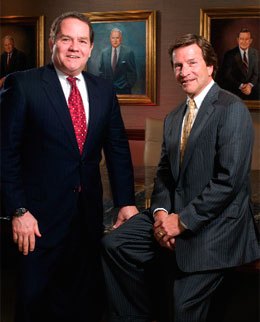|
In it for the long haul
In a tough trucking market, Canal Insurance steers a steady course
By Elisabeth Boone, CPCU
Rising fuel costs ... a slumping economy and financial market meltdown ... a soft insurance market: for the writers of truck insurance, these are the ingredients of a perfect storm.
As a commercial auto insurer, Canal Insurance Company is no stranger to the challenges that confront the American trucking industry. Based in Greenville, South Carolina, Canal is a leading provider of insurance to trucking operations through a nationwide network of independent general agents. The privately held company, which employs some 230 persons, is active in 44 states, has assets of more than $1 billion, and carries a Best’s rating of A+. For 16 consecutive years, Canal has been ranked among the top 50 property and casualty insurers by Ward Financial Group.
Now in its third generation of family ownership, Canal Insurance is managed by cousins Charles M. “Chuck” Timmons Jr., president and chief executive officer, and William R. “Rick” Timmons III, senior vice president of investments and secretary-treasurer. Both men are grandsons of William R. Timmons, who in 1933 established the William R. Timmons Agency to write trucking risks in the Carolinas and Georgia.
Over the next several years the agency had difficulty placing long-haul trucking business because of the collapse of a number of insurers. In 1942, the agency acquired Canal Insurance, an inactive insurer, and began using the carrier to underwrite commercial trucking business.
“Canal had been formed in 1939 by the First National Bank of Columbia, South Carolina, to insure the automobiles financed by the bank,” says Chuck Timmons, “but World War II frustrated both its purpose and its growth because car production resources were being redirected for the war. From 1942 on, Canal grew steadily until our grandfather met an untimely death in an automobile accident, before his grandchildren were born; we never got to meet him,” Chuck says.
William Timmons had three children who then owned the business, and his two sons became the second generation to manage the agency and the insurer, Chuck continues. Chuck is the son of Charles M. Timmons Sr., and Rick’s father is William R. Timmons Jr.
Canal operates in all but six states: New York, New Jersey, Massachusetts, California, Alaska, and Hawaii. Of its total volume, approximately 85% is trucking risks. The remainder, Chuck says, is general liability, garage lines, and workers compensation.
Although Canal writes many kinds of trucking risks, Chuck says, “We focus on the smaller, independent long-haul owner-operator. We also write intermediate-haul and local firms. We insure all kinds of cargo, including oil and natural gas, but we don’t insure anything that’s designed to explode,” he says.
Strong and growing
Thanks to its committed management team and consistent underwriting discipline, Canal Insurance has achieved impressive growth in volume, profits, and surplus.
“By 1953, Canal was licensed in nine southern and border states and was writing $2.3 million in premium,” Chuck says. “By 1958 we were licensed in 27 states and were writing $4.7 million, with surplus of just over $1 million. During the 1960s we saw steady expansion of our territory, premium, and surplus, and by 1969 we had volume of $11 million with $3.2 million in surplus.”
The 1970s saw the beginning of the automation revolution in the insurance business, and Canal Insurance rose to the challenge. “In the 1970s we expanded our staff and physical facilities and began to embrace technology,” Chuck says. “By the end of the 1970s we were writing $32 million in premium and had $17.5 million in surplus, which was 100 times our original surplus. In 1978 we became rated A+ by A.M. Best for the first time.”
Canal’s performance in the 1980s and 1990s was “extraordinary,” Chuck continues. “Our surplus doubled four times, to $400 million, and premiums rose to just under $200 million. In 1998, my father, Charles Senior, died, and I took his place as president. In 2000 the hard market hit, and over the next five years we tripled our trucking business,” he says.
A new reality
“Today we’re in a different environment from that of just a few years ago,” Chuck observes. “The commercial insurance marketplace is extremely soft, and until last fall, gas prices had doubled since 2007. Some owner-operators are parking their trucks and going to work for bigger trucking companies, and our business is down dramatically.”
The company’s 2008 premium volume was about $250 million, down from $450 million the year before, Chuck says.
Before fuel prices began to moderate last fall, the exorbitant cost of diesel forced many trucking companies out of business, and the ongoing economic downturn is putting extreme cost pressure on the firms that remain. Even if gas prices experience a further sharp decline, the marked decrease in manufacturing activity as the result of lower demand translates into greatly reduced demand for over-the-road shipping.
Given this grim scenario, Chuck comments, it’s impossible to know what the future holds or when the downward trend might give way to a recovery. “We have what we have, and the pain is shared worldwide,” he says. “There’s plenty of blame to go around, and everybody’s pointing fingers; but the question is, when will we recover?
“The trucking insurance business, of course, is strongly influenced by current economic conditions because lower interest rates and financial market problems affect our investment returns, and we have our own challenges because the soft market is depressing premium rates,” Chuck says. Looking ahead, “I hope the competition will subside and become less intense,” he remarks. “In all my years in the business, I’ve never seen a combination of circumstances like this.”
History shows that prolonged soft markets in specialty niches tend to attract players who may put cash flow ahead of underwriting principles, and the current trucking insurance market is no exception, Chuck observes. “We’re seeing prices that range from competitive to ridiculous,” he says. “There’s a lot of new capital coming in from people who don’t have a clue as to what they need to charge. We’re hoping to see that trend begin to change in 2009 as these players begin to see the losses coming in.”
Asked to describe Canal’s underwriting philosophy, Rick Timmons says, “We write a wide range of trucking risks at a fair price, and we resist overly competitive pricing, which is what’s going on right now. We’d rather be profitable than write more business at inadequate rates.”
Working with agents
Prudent pricing and careful underwriting are two key advantages Canal Insurance brings to the table; equally important, Chuck says, are knowledge and experience. “We’ve been here for almost 70 years, so we understand trucking risks and their needs,” he says. “Another strength is our distribution system. We have a wonderful group of general agents, some of whom have been working with us for 50 years or more. They also are very knowledgeable and, thanks to technology, we have as quick and efficient a quoting process as we can put together, that also allows us to gather all the information we need to make an underwriting decision,” Chuck explains.
Adds Joyce Dunn, vice president, business development: “Canal has invested heavily in technology over the last five years to enable us to be better partners with our general agents. Our general agents underwrite and issue policies on our behalf and are the first line of contact with the retail agent. Our investments in technology allow our agents across the country to provide top-quality service to their customers using our Web portal.”
For example, Dunn says, “It is vital that motor carrier filings be made immediately with the Federal Motor Carrier Safety Administration so a trucker can get back on the road. Our Web portal handles this task electronically.”
In good times and bad, the generations of the Timmons family have always known that their lifeblood is the network of agents who bring their trucking business to Canal Insurance and the William R. Timmons Agency. “We use the agency as an underwriting manager for Canal outside South Carolina; within the state, it functions as a general agency,” Chuck explains. Retail producers outside South Carolina gain access to Canal via select general agents.
“It’s usually more efficient for our general agents to place business for retailers who specialize in trucking risks and write more of them,” Chuck says, “but we encourage our general agents to work with the retailer who submits an occasional piece of business. Those submissions can become excellent business as the retailer becomes more familiar with the niche. That’s how we grew.”
A producing agent that has represented Canal Insurance for about 20 years is Truck Insurance, Inc., of Florence, South Carolina. Agency Vice President Walt Evans has high praise for Canal and its commitment to meeting the needs of his clients.
Although the agency targets trucking risks of all kinds, Evans says, “Approximately 80% of our business is traditional long-haul truckers—one- and two-power units—and the various types of freight contracts they have.” Truck Insurance works with both new and established truckers. “We always try to place new truckers with Canal, and if they don’t want to quote, we don’t want to go anywhere else,” Evans declares.
“Canal is the trucking guru,” he says. “Profitability is their main objective, and they know that major rate increases or decreases aren’t going to fix a hard or soft market. I like to use the analogy of threading a fishhook. With a steady hand and a keen eye, you’ll get that transparent monofilament line through the hook every time. That’s the way Canal underwrites and prices business,” Evans says, “and that’s why they’re our market of choice.”
Looking ahead
Amid the “perfect storm” of challenges facing its core market of independent owner-operators, Joyce Dunn comments, Canal Insurance has sharpened its focus and holds a positive outlook for 2009.
“Over the past year we have expanded our underwriting appetite for the preferred trucking risk and will continue that strategy during 2009,” she says. “We will increase our marketing and advertising support for our general agents to better brand Canal not only as a consistent underwriter of trucking insurance but also as a market for the preferred risk at a preferred premium.”
For more information:
Canal Insurance Company
Web site: www.canalinsurance.com
|
|
| |
 |
| |
William R. Timmons III (left) and
Charles M. Timmons Jr. manage
Canal Insurance Company, based
in Greenville, South Carolina. |
| |
 |
| |
The Canal Insurance team includes Laurie Fite, Operations Manager; Misty Flatford, Underwriter; Salathia Henry, Policies and Endorsements; Rita Gosnell, Policies and Endorsements; Linda Hunter, Underwriter; and Tracy Rodean, Marketing Manager/Representative. |
| |
 |
| |
“Canal has invested heavily in technology over the last five years to enable us to be better partners with our general agents.”
—Joyce Dunn, Vice President of Business Development |
|